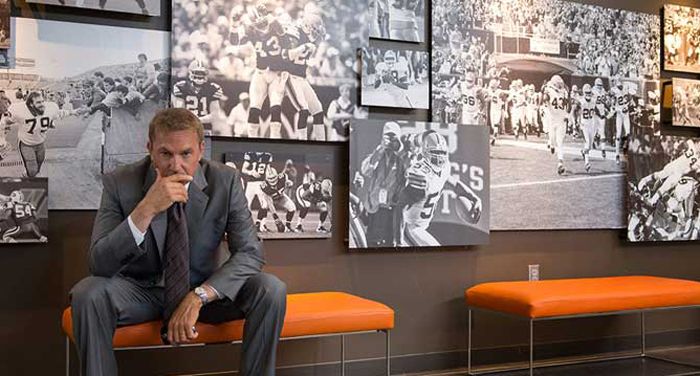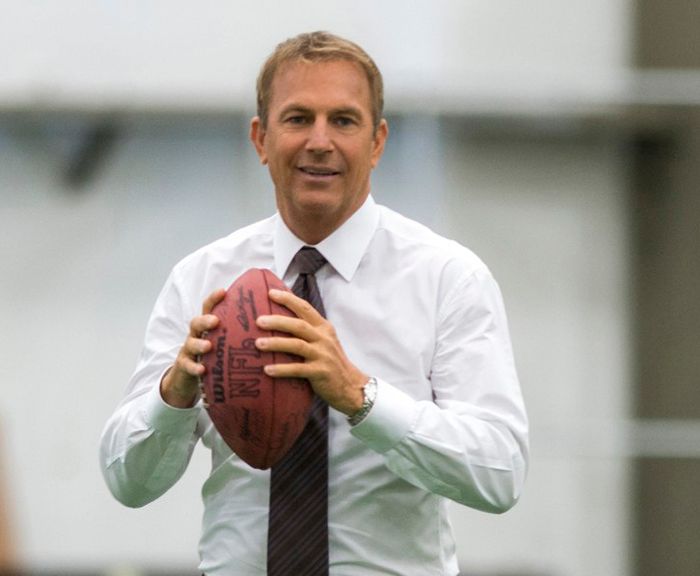Filmmaker Ivan Reitman admits he’s always been a bit of stealth player in the genre world.
Best known for some of the biggest, most popular comedies of the past four decades, Reitman has built laughs around some very straightforward sci-fi and supernatural premises in films like Ghostbusters, Twins, Junior and My Super Ex-Girlfriend, alongside the likes of Meatballs, Stripes, Kindergarten Cop and Dave.
While much of his recent output has been as a producer, this year Reitman stepped back behind the camera for Draft Day, an unconventional sports film from the perspective of an NFL franchise’s front office on the most intense, season-making-or-breaking day of the year, earning critical acclaim for the innovative cinematic approach he took to enliven the inside politics of football.
As the film makes its home-video debut, Reitman told Spinoff Online that not only has he been reinvigorated to direct again, he remains eager to get one more of those “secret science fiction films’ – namely, Ghostbusters 3 – off the ground.
Spinoff Online: Tell me about the reaction you’ve gotten from people who’ve seen Draft Day. Were you pleased by what people were telling you about it?
Ivan Reitman: Well, we had a very positive reaction. I was very pleased by what people said, particularly people who knew nothing about football, and then went on and on about how much they loved it and how much they got it and how they thought their friends would like it – people who, like themselves, knew very little about football. I always felt that as a reality about it, so it felt great to have it confirmed.
Ivan Reitman on "Draft Day," Costner and How Comedy Has Changed
Tell me about what led you to create a non-traditional sports movie that still had all of the same emotional beats and the structure of a traditional sports movie.
I wasn’t even thinking about that as much as just, “How do I deliver the goods on this really good screenplay?” and sort of take all the tropes of both a sports movie and the NFL, in particular – because it has a very firm and well known, particularly in North America, set of icons and iconography – and really use all that to tell a kind of very dynamic story, even though it’s taking place on phones and in offices. And in a very short period – the whole movie takes place over like a 12-hour period. And that was sort of the focus is sort of creating a visual style, which I’m quite proud of in terms of the way that we sort of created for doing split screens, and for keeping people in various parts of the country on the screen at the same time.
I thought that was a fascinating element of the film. When did you get that light bulb over your head of how to accomplish that, with the visual technique that you ended up employing?
Well, it was a worry right from the beginning. It was something that I was really conscious of wanting to solve, from the moment that I made the decision that I was going to direct it, which was really just after I read it. And I said, “Wow, there’s a problem here in that it’s mostly a lot of guys on telephones, not in the same room, and I have to create the energy of what this day really is like for those people in those war rooms.” And also, it’s important, the weight of it on all these young kids that are coming up from college and hoping to be part of the minute few that actually get selected. So I was always looking for it and really hired these wonderful title people who I had met, because they had done the work on my son’s head credits on his films, which he became quite famous for. I had produced Up in the Air with Jason [Reitman], and so I got to know them, and I gave him a scene – I think the scene I gave them was pretty early in the shooting, with the telephone call between Kevin Costner’s character and Chadwick Boseman’s character, and I instinctively shot both of them, but they weren’t on the telephone where they were moving back and forth – the motion of the characters and of the cameras was pretty dynamic and I was curious to see what we could do, what kind of new rules we could create for the film, visually and we started playing with that in the first week of shooting, and they sent me three or four partial samples of what things they were thinking about. And we started talking about that a lot, right away. And then I started thinking about it very specifically while we were shooting.
Reitman on What His "Ghostbusters 3" Would've Been, and Why He's Not Doing It
Tell me about the fun of taking Kevin Costner, who’s known for playing athletes on the field, and promoting him into the front office, so to speak – playing with his image that way for your film.
Well, he certainly works. He is a leader. He’s always been a leader in the kinds of things that he plays. When I read the script that very first time in the middle of the night, I heard his voice very clearly, and went to him right after and fortunately he responded to the material the way I did. So I was pretty confident he would be pretty amazing in it.
Because of the innovative way you’ve found to shoot this, did that reenergize you in general toward staying behind the camera as a director? You’ve had so many producing efforts of late, but it was nice to see you shooting again. Are you eager to get back behind the camera?
Yeah, thank you for saying that, because I in fact was reenergized. It wasn’t just finding that technique. I think when you look closer at my comedies, they’re really quite innovative in a lot of different ways, because I’ve done a lot of secretive science fiction movies – like Twins is really a science fiction movie. So it’s not something that’s foreign to me, but I think making this film and not having to worry about comedy so deeply was actually very refreshing and very satisfying making this film.
That said, are you still planning the Twins sequel that’s been talked about? Maybe direct it?
Well, I was never going to direct the Twins sequel. It seemed like an interesting piece of business from a studio standpoint, and because technically, I’m a co-owner of all those rights. It seemed like a fitting professional role. It remains to be seen whether that gets made or not, as beloved as all the characters are. It makes much more sense, I think, to do some new Ghostbusters film, and I think that will get made.
Since the last time we talked, when Draft Day came out in theaters, there was a very different plan in place for Ghostbusters then, it sounds like, than now. What can you say about the project as it stands and what you’re still excited about where it’s going?
Well, I love the concept of Ghostbusters. I love the technology of it. I love how resonant it is for audiences around the world, still today, 30 years later. And I think we’re working on it. The studio’s working on it. I’m working on it. [Dan] Aykroyd and I are going to meet in Toronto in a couple of weeks about it. So I still remain positive.
This year marks 30 years since that film first hit theaters. Besides just the general quality of the movie, what do you think has kept the movie so front and center in people’s hearts and minds over three decades?
I think there’s something really positive and optimistic about the storytelling and the characters, and I think it’s the combination of that with these very, highly likable actors in a situation that was highly unusual. It still remains somewhat unusual today. I think it’s all those things. I mean, I’m guessing, but I think those are things that were very important.
Do you have some plans to work with your son Jason again, and what’s sort of been the great both creative and personal reward of that professional relationship.
Well, I think the personal rewards being the greatest. It’s just further brings us closer. It gives us – we’ve been very helpful to each other. I remember Jason making some wonderful suggestions to me, particularly in post-production, on Draft Day, and I think I was quite helpful to him on Men, Women & Children, which is his new film, which is going to premiere at the Toronto film festival. You know, we’ve been talking about trying to find something maybe that we could either direct parts of or just work together again, in some kind of fun way.




